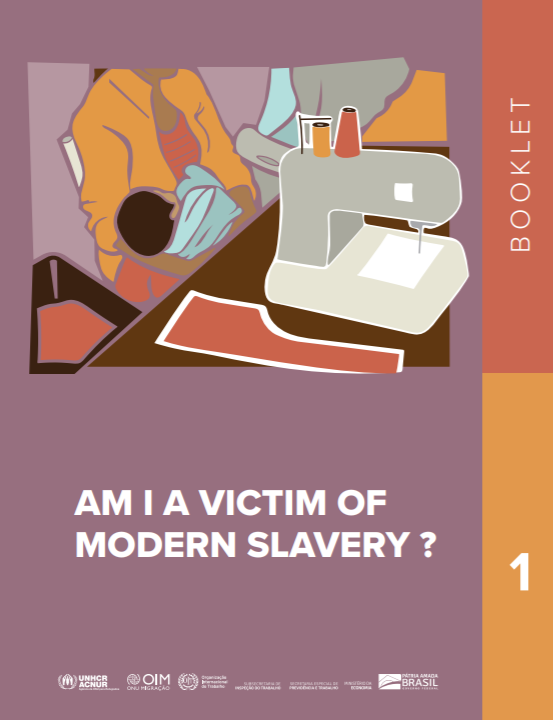The Ministry of Labor and Social Security, through the Undersecretariat for Labor Inspection (SIT), in partnership with the International Labor Organization (ILO), the International Organization for Migration (IOM) and the United Nations High Commissioner for Refugees (UNHCR), developed the Projeta o Trabalho website, with important information for migrants and refugees about work and employment, available in Portuguese , Spanish , English , French and Arabic .
There are several booklets with information on Slave Labor, Child Labor, Domestic Work, Temporary Work, among others.
What do I need to work legally in Brazil?
With your CPF in hand, you can issue a Work and Social Security Card – CTPS. This is the same document that Brazilians have. The CTPS is granted on a definitive basis, with no expiration date. For more information about documents, please click here .
What are my labor rights in Brazil?
Brazilian labor rights must be respected regardless of the employee’s nationality. Note that employment rights include, but are not limited to:
- Maximum working hours of 12 hours a day and 44 hours a week;
- Employment Card signed by the employer;
- Compulsory paid leave;
- 13th salary, in addition to twelve payments during the twelve months of the year;
- Right to a monthly minimum wage (R$ 1.412,00 if you work 44 hours a week) or proportional payment;
- One day of weekly paid rest – preferably on Sundays;
Download the Labor Rights Booklet for Immigrants and Refugees by clicking here.
For more information on Labor Law in Brazil, click here .
Important: If you suspect that your employment rights are being violated, seek legal assistance.
Women's labor rights in Brazil
I am a woman, do I have the same labor rights as men?
Yup. Furthermore, women have certain specific rights, such as:
- 120 days maternity leave
- Women cannot be fired for being pregnant.
- Pregnant women have the right to leave work to visit a doctor
- A woman cannot be unfairly dismissed for five months after giving birth
Important: If you suspect that your employment rights are being violated, seek legal assistance.
Child labor
Can children work in Brazil?
No. Children under the age of 14 cannot work in Brazil. Children over 14 years old can work under special conditions:
- Maximum 6 hours of work per day
- The employee is obliged to allow time for the children to go to school
- Right to take holidays from work simultaneously with school holidays
- Children cannot work in hazardous conditions
- Children cannot work at night.
Important: If you suspect that your employment rights are being violated, seek legal assistance.
What is the minimum wage in Brazil?
In Brazil, workers who work 44 hours a week or more cannot be paid less than the national minimum wage. The minimum wage stipulated by the federal government is R$ 1.412,00 and may vary more depending on the state.
Important: If you suspect that your employment rights are being violated, seek legal assistance.
No company hires me because I don't speak Portuguese. What can I do?
Most companies require a basic level of Portuguese to hire you. For more information about Portuguese courses, please click here.
How to become a microentrepreneur (MEI)?
In Brazil, there is mobility for individual microentrepreneurs (MEI) for businesses with revenues of up to R$81,000.00 per year. To qualify for this modality, you cannot have a stake in another company as a partner or holder, and you must have a maximum of one contracted employee who receives the minimum wage or the minimum wage for the category. The MEI will be exempt from federal taxes.
To become an individual micro-entrepreneur, check that the activity you want to carry out fits within the authorized occupations. Then register on Portal do Empreendedor.
Unlike the rules applied to Brazilians, an immigrant who wants to formalize as a MEI only needs to inform the country of origin and the number of one of the following documents: national migratory registration card, provisional national migratory registration document or asylum application protocol.
Can the company I work for register me on e-social?
Yes . E-social is a system where employers communicate with the Government passing on information related to workers. Through this electronic transmission of information, the bureaucracy of tax, social security and labor obligations is reduced, in addition, it is a way of guaranteeing that the social security and labor rights of workers are guaranteed.
To admit a refugee worker, it is not necessary to have a National Immigration Registry, Provisional Document of National Immigration Registry or the Refugee Request Protocol, it is enough that the person has the CPF and the Social Identification Number – NIS (PIS , PASEP or NIT).
To learn more, visit the Federal Government website.

